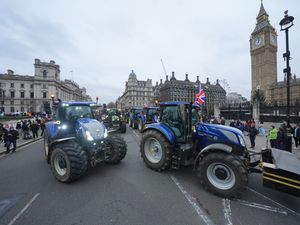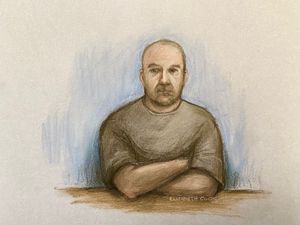Farm tax changes under fire in Parliament as angry farmers protest outside
Thousands of people gathered along Whitehall for another demonstration against the ‘toxic’ Budget changes.

Government plans to impose inheritance tax on farms have come under fire on several fronts in Parliament as angry farmers drive their tractors through the streets outside.
Thousands of protesters have gathered along Whitehall for another demonstration against the “toxic” Budget in October which farmers say puts their businesses, futures and food security at risk.
Chancellor Rachel Reeves’s plans include the introduction of a 20% inheritance tax rate on farms worth more than £1 million and speeding up the phase-out of EU-era subsidies in favour of nature-friendly farming payments.
During speeches outside Downing Street, a minute of silence was held in the streets “for all the farmers who are no longer here” amid ongoing concern for the wellbeing of those facing the impacts of the changes.
Will Elliott, 50, drove his tractor for three hours from his farm near Grafham, south of Guildford in Surrey, to attend the protest.
Speaking to the PA news agency, Mr Elliot, who is a fourth-generation farmer on the family farm, said: “The industry is already down on its knees and this is just another kick in the teeth.

“Obviously, the idea is that we want to pass it down to the next generation, but farmers are asset-rich, cash poor, we’re not going to have the money to pay the inheritance tax.”
Claire Fifield, 26, who lives in London but regularly takes time off to help her step-family run their farm in Amersham, Buckinghamshire, said they are tenant farmers who now fear they will not be able to pass down the business.
“We’d have to sell half the flock, half the cattle, sell some of the machinery, then you got half the income for the next year, plus the rental costs,” she said.
The protest comes as the Government faced intense criticism over the inheritance relief changes from farming leaders, tax experts and opposition MPs inside the Palace of Westminster on Wednesday.
Sir Keir Starmer was confronted about the plans at Prime Minister’s Questions in the Commons.
Liberal Democrat leader Sir Ed Davey asked if the Prime Minister would “change course” and Conservative MP Jerome Mayhew accused Sir Keir of being “duplicitous” to farmers during the general election campaign.
In response, Sir Keir reiterated the Government’s line that “the vast majority of farmers will be unaffected”, and he sought to highlight the Government’s pledge to spend £5 billion on farming in the next two years – funding that maintains current levels.

Earlier, farming, land and tax experts told the Environment Committee the policy would unlikely have the intended effect of closing a loophole, which enables wealthy people to buy up agricultural land to avoid inheritance tax.
Dr Arun Advani, director of the think tank CenTax, told MPs it is likely the inheritance tax changes will only “slightly” slow land price inflation.
He said a 20% rate is “still much more attractive than other sorts of assets”, meaning farmers will continue to compete with wealthier people purchasing agricultural land for tax purposes.
Asked whether there is unnecessary concern over paying the tax, Jeremy Moody, secretary and adviser at the Central Association of Agricultural Valuers (CAAV), said the strategies ministers have outlined for how farmers will pay the tax over 10 years are “simply not realistic”.
Mr Moody said CAAV modelling shows the cost of paying the tax over a decade could amount to around three-quarters of an extra employee on the business.
“It is a very significant shock on what the business can actually pay out of earnings, leaving only not much, if anything, left for breakfast or for reinvestment,” he said.
Stuart Maggs, head of tax and partner at Howes Percival law firm, warned the committee that agricultural estates get a rate of return of about 0.5% to 1%.
“It simply means this is going to be unaffordable and so farms are going to have to sell land or sell up. And it’s going to happen a lot.”
He later added it will be the “unfortunate” who are most caught by the changes, such as those who die early and those who cannot plan.

“By any measure that has to be a bad way to draw up a tax,” he said. “To tax the unfortunate I don’t necessarily think is the right way the Treasury should be bringing things together.”
Farming leaders told the committee they had all written to the Prime Minister, asking for a pause and a full consultation to find a solution to the loophole that works for everyone.
Victoria Vyvyan, president of the Country Land and Business Association, said: “Let’s stop and think. Let’s not just crash forward, hoping against hope that this will turn out alright or it will turn out differently.”
Tom Bradshaw, National Farmers’ Union president, started crying as he spoke about the risk that the tax changes pose to farmers taking their lives.
“No policy should ever be published that has that unintended side effect,” he said.
Addressing arguments that money does not necessarily trigger this response, he became emotional as he said: “It’s not money. This is a lifetime of work, it’s the heritage and the custodianship of their farm.”
Asked whether Sir Keir had a message for farmers who are protesting in Westminster on Wednesday, the Prime Minister’s official spokesman said: “This Government recognises that food security is national security; that’s why we remain steadfast in our support for farmers.”
Asked whether there would be any rethink on inheritance tax, the spokesman added: “No. We have been clear that we understand the strength of feeling about the changes, but we are clear this will only affect a small number of estates.”





